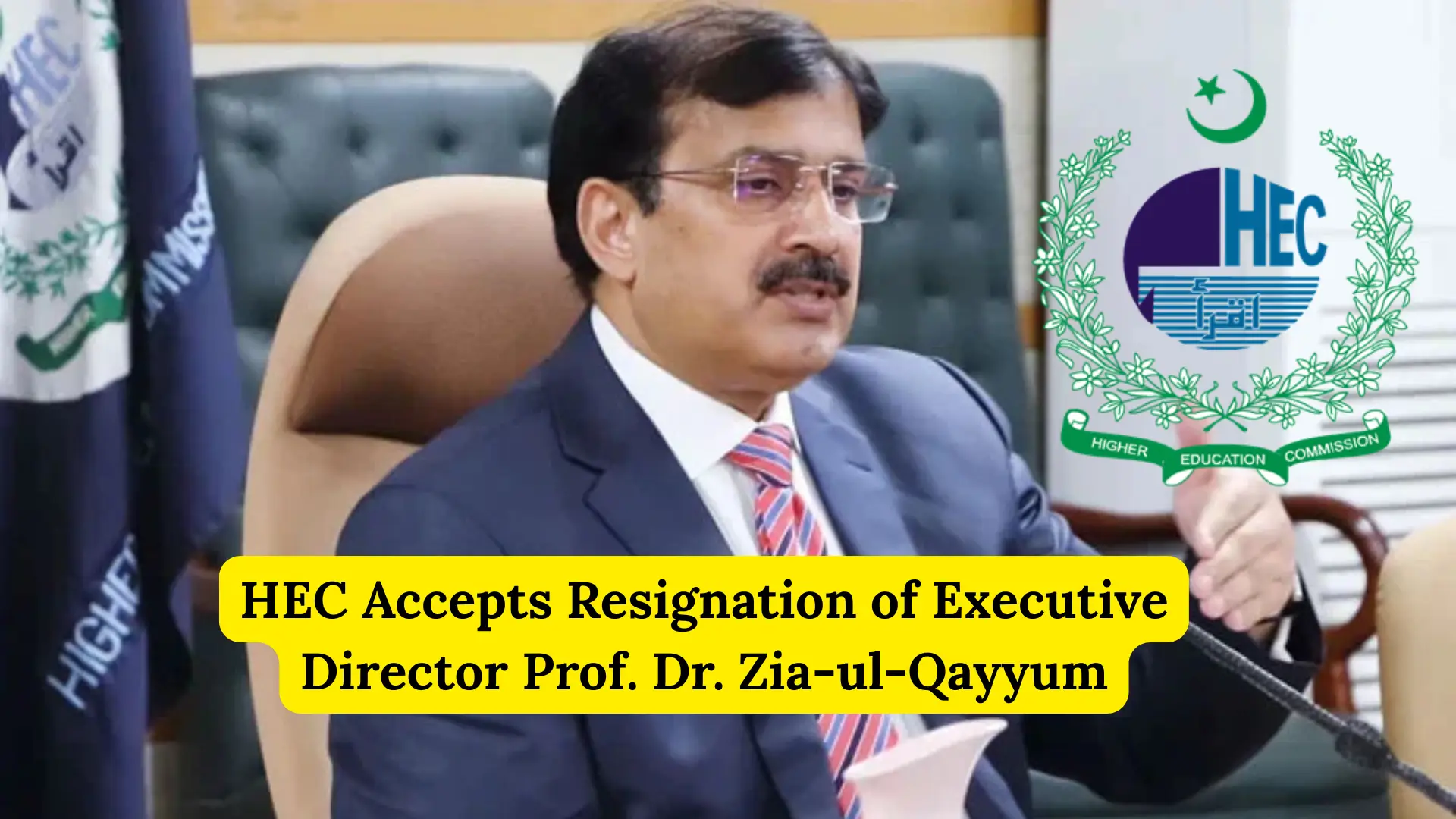HEC Accepts Resignation of Executive Director Prof. Dr. Zia-ul-Qayyum. The Higher Education Commission (HEC) of Pakistan has officially confirmed that its Executive Director, Prof. Dr. Zia-ul-Qayyum, has resigned from his post with immediate effect. The resignation was accepted following the approval of the HEC Chairman, marking a significant change in the leadership of the country’s top higher education regulatory body.
Official Notification and Immediate Effect
According to an official notification issued on October 2, 2025, the resignation of Prof. Dr. Zia-ul-Qayyum was accepted immediately. The office order regarding his resignation has been circulated to top federal and provincial government officials, ensuring that all stakeholders in Pakistan’s higher education sector are informed. This includes the Prime Minister’s Secretariat, President’s Secretariat, Ministry of Federal Education & Professional Training, and the governors of all provinces, as well as the vice-chancellors of public and private universities across Pakistan.
The immediate acceptance of the resignation highlights the HEC’s commitment to maintaining transparency and ensuring that institutional processes are clearly communicated to all relevant authorities.
Contributions of Prof. Dr. Zia-ul-Qayyum
Prof. Dr. Zia-ul-Qayyum has been a key figure in Pakistan’s higher education landscape. Serving as the Executive Director of HEC, he played a vital role in overseeing major initiatives aimed at improving academic standards and institutional governance across the country. During his tenure, Dr. Zia-ul-Qayyum contributed to policy development, research funding allocation, and implementation of programs designed to enhance the quality of higher education in Pakistan.
Under his leadership, HEC undertook numerous projects to support universities in curriculum development, faculty training, and digital learning initiatives. He was also instrumental in fostering collaboration between Pakistani universities and international institutions, promoting academic exchange programs, and improving research opportunities for scholars and students alike.
Impact on the Higher Education Sector
The resignation of an executive-level official such as Prof. Dr. Zia-ul-Qayyum is expected to have a notable impact on HEC operations, at least temporarily. HEC plays a central role in regulating higher education standards, accrediting universities, and ensuring quality in academic programs nationwide. The absence of a permanent executive director may influence ongoing initiatives, research funding allocations, and policy execution until a successor is appointed.
Universities, both public and private, will need to coordinate with interim leadership to maintain continuity in programs and ensure that academic standards are upheld. The circulation of the office order to vice-chancellors ensures that all university administrations are aware of the leadership change and can adjust their operational planning accordingly.
Government and Institutional Communication
HEC’s official communication about Prof. Dr. Zia-ul-Qayyum’s resignation reflects the organization’s commitment to formal protocols and transparency. By sending the office order to key government offices, including the Prime Minister’s and President’s Secretariat, the HEC ensures that all relevant authorities are informed and any policy-related decisions can continue without disruption. Similarly, informing governors and vice-chancellors of the change provides clarity to provincial education authorities and university management teams.
This structured communication process is essential in maintaining trust and stability within Pakistan’s higher education system, ensuring that there is no confusion among stakeholders regarding leadership and decision-making authority.
No Announcement Yet on Successor
As of now, the HEC has not announced a successor for the position of Executive Director. The absence of an immediate replacement creates a temporary leadership gap in one of Pakistan’s most crucial educational institutions. Selection of the new executive director will likely involve careful consideration of candidates’ academic and administrative experience, as the role demands strong leadership, policy expertise, and an understanding of both national and international higher education frameworks.
Until a successor is appointed, HEC’s operations may be overseen by interim leadership or delegated officials to ensure that ongoing projects and academic programs continue smoothly. The higher education community is awaiting the announcement of a permanent executive director to restore full administrative capacity.
Role of the Executive Director in HEC
The Executive Director of HEC plays a central role in implementing the vision and policies of the commission. Responsibilities include overseeing academic development programs, managing funding and grants for universities, accrediting degree programs, and ensuring compliance with national education standards. The executive director also acts as a liaison between HEC, the federal government, and provincial education authorities, coordinating strategies to improve higher education nationwide.
Prof. Dr. Zia-ul-Qayyum’s resignation underscores the importance of the executive director’s role in maintaining continuity and advancing Pakistan’s higher education goals. His departure may prompt HEC to accelerate the search for a qualified replacement who can sustain ongoing initiatives and guide the organization through future challenges.
Reactions from the Academic Community
While the official statements regarding the resignation have been formal and procedural, the academic community has taken note of the development. Faculty members, researchers, and university administrators recognize Prof. Dr. Zia-ul-Qayyum’s contributions and the potential impact of his resignation on academic programs and research initiatives. Many stakeholders are hopeful that the HEC will quickly appoint a successor to ensure that key projects, including scholarship programs, research grants, and quality assurance initiatives, continue without interruption.
Looking Ahead
The Higher Education Commission remains a critical pillar in Pakistan’s educational system. Leadership changes, such as the resignation of an executive director, are significant events that affect strategic planning and academic governance. Moving forward, HEC is expected to announce a new executive director who can continue to promote higher education development, support university growth, and enhance research and academic quality across the country.
Until then, HEC will rely on interim management to ensure that operations proceed smoothly. Universities and academic institutions will closely monitor announcements and adjust administrative and academic activities to align with ongoing projects and HEC directives.
Conclusion
The resignation of Prof. Dr. Zia-ul-Qayyum marks an important transition for the Higher Education Commission of Pakistan. With immediate acceptance of his resignation, the HEC has communicated this leadership change to federal and provincial authorities as well as universities nationwide.
While no successor has been announced yet, the academic community and stakeholders are anticipating a prompt appointment to maintain the continuity of HEC’s vital initiatives. Prof. Dr. Zia-ul-Qayyum’s tenure as executive director has been notable for his contributions to higher education policy, research development, and university collaboration, and his departure will be felt across the sector.
HEC’s ongoing commitment to transparency, governance, and academic excellence will guide the organization through this transition and into the future of Pakistan’s higher education landscape.
















